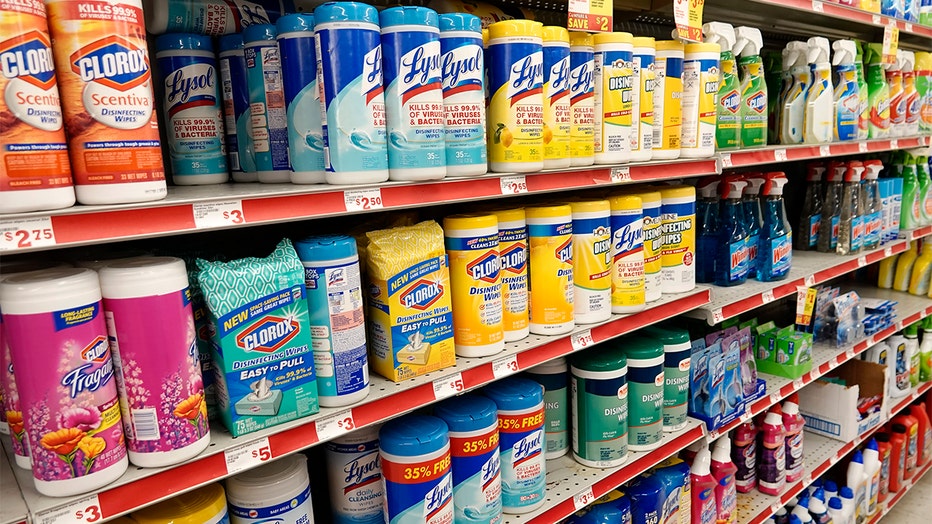Lysol, Clorox likely effective in killing COVID-19, EPA suggests, but testing hasn’t yet been done
LOS ANGELES - With over 85,000 people infected across the world with the novel coronavirus, now known as COVID-19, companies that sell sanitation products are touting their ability to kill viruses.
Lysol and Clorox advertise their products’ ability to kill 99.9 percent of germs. The two companies have set up FAQ pages about the coronavirus indicating that their products have “demonstrated effectiveness against viruses similar to COVID-19,” which the International Committee on Taxonomy of Viruses designated as SARS-CoV-2. SARS stands for severe acute respiratory syndrome, while COVID-19 stands for Coronavirus Disease 2019.
The companies’ FAQ page referenced the “2019 Novel Coronavirus,” which is formerly known as 2019-nCoV and now known as SARS-COV-2 or COVID-19, a new strain of coronavirus first identified in an investigation into an outbreak in Wuhan, China.
“Specific Lysol products have demonstrated effectiveness against viruses similar to 2019 Novel Coronavirus (SARS-CoV-2) on hard, non-porous surfaces,” the company said.
RELATED: Does wearing a mask protect you from coronavirus and other infectious diseases?
Lysol listed several products that could be used against coronavirus, in accordance with the EPA Viral Emerging Pathogen Policy.
“Under this guidance, EPA is providing pesticide registrants with a voluntary process to enable the use of certain EPA-registered disinfectant products against this emerging viral pathogen. Using disinfectant products on surfaces can help limit the spread of diseases,” the EPA said in a release.
Clorox also listed three products that could be used against SARS-CoV-2, according to the EPA policy.
“Coronaviruses are enveloped viruses, meaning they are one of the easiest to kill with the appropriate disinfectant product,” the agency added.

Family Dollar Store, anti-bacterial wipes and cleaning products. (Photo by: Jeffrey Greenberg/Education Images/Universal Images Group via Getty Images)
Dr. Saskia Popescu, a Phoenix-based senior infection prevention epidemiologist, provided a further explanation of an enveloped virus to Business Insider.
The new coronavirus is particularly susceptible to cleaning products, Popescu said, explaining that an enveloped virus is wrapped in a lipid layer from the infected host cell. While that protective layer is supposed to help the virus survive, it is easily compromised by disinfectants, which makes this type of virus much easier to kill than non-enveloped varieties such as the norovirus, Popescu told the outlet.
But the companies’ FAQ pages do not provide evidence or claims that their products kill COVID-19 on contact, The Hill noted. And product testing on the new strain has not happened yet due to the outbreak happening so recently, The Wall Street Journal reported.
RELATED: Coronavirus: Symptoms, testing and how to prepare amid growing COVID-19 outbreak
Meanwhile, Popescu told Business Insider, "Bleach kills everything."
"I mean a bleach-based disinfectant, 100%, is going to kill it very, very easily," the epidemiologist said.
A study released this month also suggested coronaviruses could survive on surfaces between two hours and nine days.
U.S. health officials have recommended disinfecting frequently touched surfaces with household-cleaning sprays and wipes to help stop the virus’ spread, The Journal reported.
However, the products must be used specifically as directed to work, the report said. For example, Clorox said when disinfecting wipes are used, a surface must stay wet for four minutes, while spray cleaner with bleach needs to stand for at least 30 seconds, according to the paper.
A spokeswoman for Clorox told The Journal that the company has increased production. Lysol has also boosted production, as the two companies brace for a surge in demand due to the coronavirus outbreak, The Journal reported.
“In the coming days, things like disinfecting surfaces and cleaning hands are going to become more important to the public, to the magnitude of what’s required in hospitals,” said Emily Landon, medical director for infection control at the University of Chicago Medical Center, according to the report.
The U.S. has about 60 confirmed cases of COVID-19. Worldwide, the number of people sickened by the virus hovered Friday around 85,000, and there were more than 2,900 deaths, most of them in China.
Most infections result in mild symptoms, including coughing and fever, though some can become more serious and lead to pneumonia. Older people, especially those with chronic illnesses such as heart or lung disease, are especially vulnerable.
Health officials think it spreads mainly from respiratory droplets when an infected person coughs or sneezes, similar to how the flu spreads.
COVID-19 is “thought to spread mainly from person-to-person,” the CDC said, adding that it is particularly between people who are in close contact with one another (within about 6 feet) and through respiratory droplets produced when an infected person coughs or sneezes.
“It may be possible that a person can get COVID-19 by touching a surface or object that has the virus on it and then touching their own mouth, nose, or possibly their eyes, but this is not thought to be the main way the virus spreads,” the CDC said.
The Associated Press contributed to this report.

